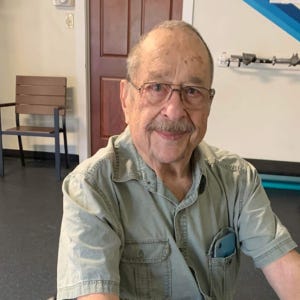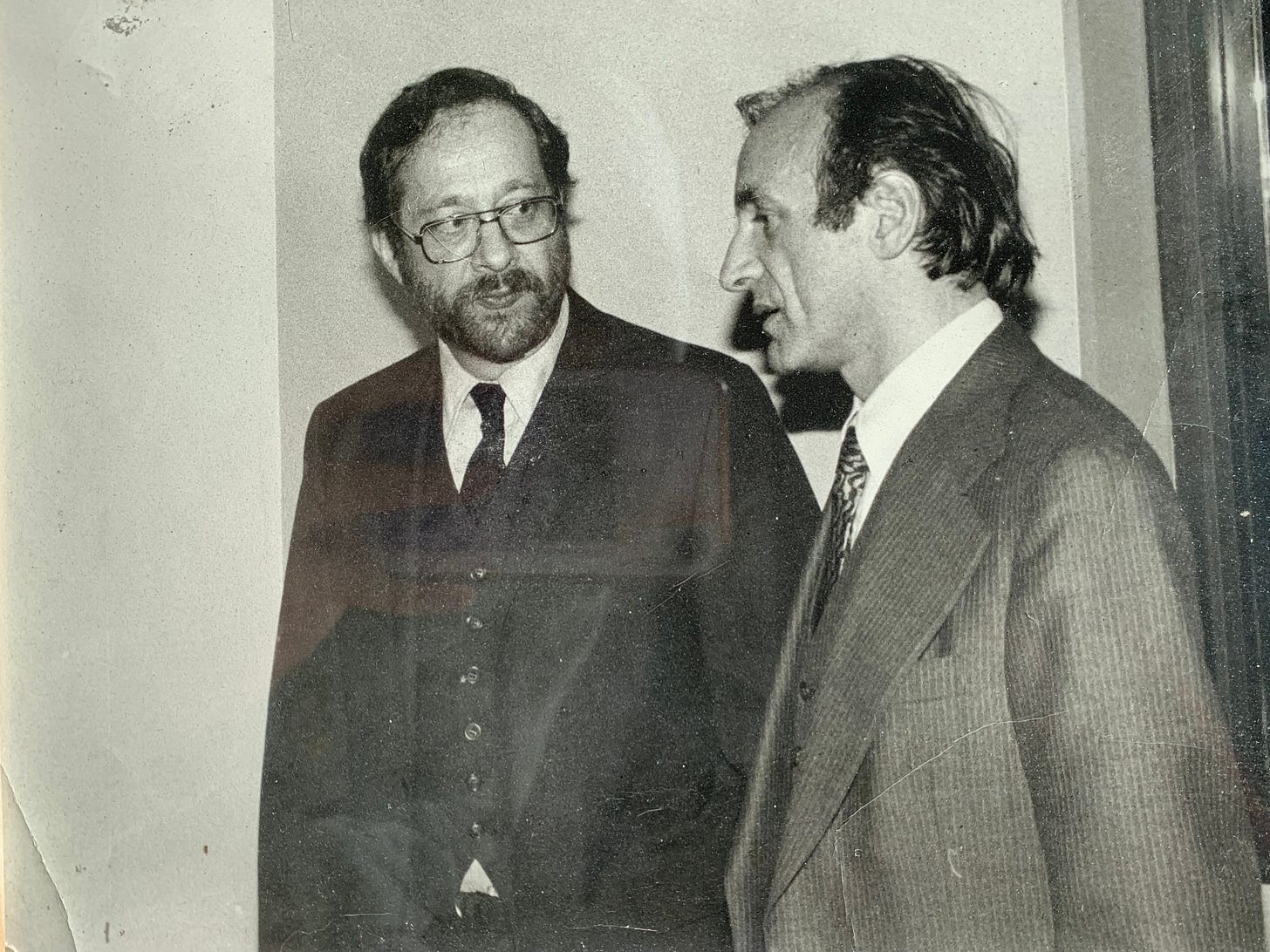Studying the Shoah: An Educational Series
A Holocaust series I ran at the University of Bridgeport and my story of meeting Elie Wiesel.
I lack words, but I am compelled to write, compelled.
I want to ask you all not to forget the dead.
I want to beg you, asking in every way I know how, to take our revenge.
I want you to leave a mark for us – a headstone as tall as the heavens,
A commemoration that the whole world will see –
A pillar of neither marble nor stone but of good deeds.
I believe with perfect faith that only such a headstone can ensure you and your children a better future.
From the diary of Donia Rosen, June 23, 1943
Hi there. I’m Fred, Miranda’s dad, taking over The Shabbat Drop this week. I’m writing because Yom HaShoah, Israel’s Holocaust Remembrance Day, was this past Monday. Holocaust education is something important that I have a bit of a connection to.
From about 1966-1992, I was an English professor at the University of Bridgeport in Connecticut. In 1977, I was due for a sabbatical from teaching and needed a project. I decided to run a series about the Holocaust at UB to fill my time. I’m not sure why I chose this topic; I didn’t have a great deal of connection to the Holocaust. My grandparents, originally from modern-day Lithuania, came to the U.S. in the late 19th century, so none of my family had perished in the Holocaust. It’s not like I read or saw movies on the subject that really moved me either. So I didn’t know why, but I felt compelled to run this education series.
I applied to the State of Connecticut for a grant and secured $13,000 to run the series. The program ran the entire spring semester of 1977, starting in February and running until May. It was held on Monday nights and was free to the public, but you had to sign up in advance. I had colleagues/friends in my department who were not Jewish who helped me.
We had a specialist come in to present on a different topic, address the crowd, and break into smaller groups to address the topic, so people really learned about it by speaking about it. Here’s the list of sessions we held throughout the semester with their presenters:
Eastern European Jewry - Elie Wiesel, writer, professor, activist, Nobel laureate, Holocaust survivor
The Growth of National Socialism - Prof. Keith Bird, Director of Continuing Education at UB, WWII historian
Nazi Laws Against the Jews and the Jewish Response - Prof. Isaiah Trunk, chief archivist of the Yiddish Scientific Institute YIVO in New York, Holocaust historian
The Holocaust and the Literary Imagination, film: “St. Matthew’s Passion” - Prof. Lawrence Langer, author, scholar of Holocaust literature
Roosevelt and the Holocaust - Prof. Henry Feingold, historian of American Jewry
Theology After the Holocaust - Prof. Emil Fackenheim, philosopher, rabbi, Holocaust survivor
Life in the Death Camps - Prof. Terrence Des Pres, writer, Holocaust scholar
Workshop: Being an Oppressor and Being Oppressed - Prof. Donald Wolk, psychologist
What We Still Don’t Understand About the Holocaust - Arnost Lustig, author, playwright, Holocaust survivor
Films: “Triumph of the Will” and “Night and Fog” with Commentary by Prof. Keith Bird
National and International Bureaucracy, Film: “Nuremberg” - Prof. Justus van der Kroef, political science educator
State of Israel: A Challenge to Jewish and Christian Theology - Prof. Irving Greenberg, scholar, author, rabbi
Bureaucracy at the State Level - Gloria Shaffer, Secretary of State of CT
Bureaucracy at the Municipal Level - Nathaniel Plotkin, lawyerParallels and Comparisons with Bureaucracy in Nazi Germany - Prof. Keith Bird
Panel Discussion: The Moral and Ethical Implications of the Holocaust - Richard Tilden, moderator; Prof. Joan Ringelheim, Research Director of the Permanent Exhibition, Director of Education and Director of Oral History at the United States Holocaust Memorial Museum; Rabbi Leon Waldman, Father Thomas Fitzgergald, Rabbi Arnold Sher
We had thousands of attendees at these sessions, especially when Elie Wiesel spoke. In fact, he was supposed to talk on a certain day, but his agent called up the day before and told me that a very close friend of Elie’s in New York was very ill and perhaps close to death. Understandably, Elie wanted to see his friend and asked if we could switch the day he’s supposed to speak. I said I’d try my best to switch days but I asked in return if Elie could have a small private gathering after his talk with some of the faculty. I knew Elie did not want a reception of any kind, but he had agreed to do that for us.
I made calls all over - the newspapers, the radio - to change the time around for Elie to speak. He packed a theater. There were so many people who wanted to hear him they had to connect wires to other rooms for people to hear him. After he spoke, Elie said to me “This is one of the best gatherings on the Holocaust I’ve been to since I’ve been in the U.S.” Then we had an exchange I’ll never forget:
Elie asked what brought me to run a series on this topic, and I said, “I’m really not sure. He looked at me and said, “It’s because you’re Jewish, that’s why.” He was really gracious and very nice.
This series on the Holocaust was very fulfilling for me. I became friends with Holocaust survivors, like Jolie Zeleney. She was a young girl in the camps and eventually fled to Israel. I met a guy who was a Jewish doctor who was forced to help the Nazis carry out their plan to exterminate the Jews. Even with the Hippocratic Oath, he was forced to help the Nazis take lives.
I taught a class on the Holocaust part-time at Sacred Heart. I started reading a lot about it but reached a point when it became overwhelmingly depressing and I needed a break after a year or two of teaching it. But a lot of people gained a lot from it.
To study the Holocaust (Shoah) is to confront the history of a nation known for its enlightenment, its wealth of art, philosophy, and literature, and recognize that a nation led by the top government officials planned and organized a policy to first eliminate and then exterminate an entire people in its own country and then in other nations in Europe based on a belief that a segment of humanity was inferior because of the notion that a religious allegiance (Judaism) was the basis for its inferiority and that its "inferiority" was passed on through an individual's blood.
The Holocaust teaches us that a nation with serious economic issues can easily turn a civilized nation, with a history of strong religious beliefs, into a murder machine with little or no protest from its citizens.
People ask why are Jews so fixated on the Holocaust because it’s in the past. My answer: no, they’re the People of the Book and never forget, they carry it with them, it’s their past, therefore it’s always in their present. Some survivors, when they went to Israel they were treated horribly because some Israelis saw them as going passively going to their graves. Over time that all changed when their attitude changed when they realized that was wrong.
I hope you all had a meaningful Yom HaShoah and continue to learn to keep the memory of the victims alive. Shabbat Shalom.






